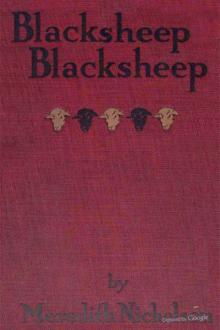Blacksheep! Blacksheep!, Meredith Nicholson [reading women .txt] 📗

- Author: Meredith Nicholson
- Performer: -
Book online «Blacksheep! Blacksheep!, Meredith Nicholson [reading women .txt] 📗». Author Meredith Nicholson
She thrust the sheet into an envelope and sealed it.
"I trust you completely," she said, lingering with, a smile upon the last word. "I shall be at that address until the first of October. You can wire me in any emergency."
When the Governor reappeared they were seemingly in the midst of a leisurely discussion of the drama.
"Back into the bag they go," said the Governor. "Everything's all right, Julia. I checked up the items with my inventory and am entirely satisfied. I'm delighted that you two get on so well together; but I knew you would hit it off. Mr. Comly has been most kind and considerate, Julia. In my long pilgrimage I have never before met a man so much to my taste. The Wandering Jew and the Flying Dutchman had no such luck. Sweet it is to wander with a good comrade, taking no care for the morrow, but letting every day suffice unto itself."
He walked to a grand piano at the end of the room, sat down and began to play.
Surprise was dead in Archie where the Governor was concerned; he could only marvel at the ease and finish with which the man made the room vibrate with the most exquisite melodies of Schumann, Chopin, MacDowell. He played for half an hour without airs or affectations, things that bruised and hurt the spirit by their very tenderness and wistfulness.
"It's as though some one had been flinging handfuls of rose leaves into the room," said Julia softly when the last chords had died away.
The music had at least served the purpose of dispersing any unhappy hovering ghosts, and she was quick to seize the moment as a propitious one for her departure. The Governor did not demur when she asked him to see if her car was waiting.
"You are not afraid to drive out alone? I should be glad, you know, to make the run with you."
"Not in the least afraid," she answered lightly.
Fear, Archie thought, was not a thing one would associate with her. The Governor brought her coat, a long garment that covered her completely. She produced from the bag a cap which she substituted for the hat and Archie had thus his first view of her handsome head and abundant dark hair and her face freed of the baffling shadow.
In carrying her wrap into the room the Governor had frustrated any hope she may have had for a private word with him; but she betrayed no resentment.
"It's really much nicer changing indoors," she laughed, standing before a mirror to adjust the cap. "Coming in I shifted my headgear just before we reached town. Behold me now, a woman transformed!"
The Governor plucked Archie's sleeve as a sign that he was not to drop back and she walked to the car between them.
With a smile and a wave of the hand she was gone and they stood at the curb looking after her until the limousine was out of sight.
"Thank you, lad," said the Governor quietly.
They went up to his den, where they smoked for some time in silence. The Governor seemed to be gathering himself together after the strain of the three difficult hours and when he spoke finally it was with a deep sigh.
"Well, Archie, we must bear ourselves as men in all our perplexities. We are put into this world for a purpose, every chick of us, and there's no use kicking the shins of the high gods. I feel a leading; there's something pulling us both; unseen powers knocking us about. Tomorrow I shall be engaged most of the day; there are some of the brotherhood to meet and it must be managed with caution. I suggest that you stretch your legs in the park and feed the swans as a tranquilizer. Soon we shall be abroad on the eternal quest. The quest for what, I see written in your eyes! For peace, Archie; for happiness! It may be nearer than we think—there's always that to tie our hopes to!"
"It would be possible, I suppose," said Archie slowly, "for us to cut it all out, settle back into our old places—"
"Never!" cried the Governor., "I tell you we've got to complete the circle! If we stop now we're ruined, both of us! We've got to go right on. I know what's the matter with you; it's that dear sister of mine who has wakened in you all manner of regrets and yearnings for your old life. Ah, she couldn't fail to affect you that way; she's so wholly the real thing! Seeing her probably made you homesick for your Isabel. There! I thought you would jump! And maybe you think I haven't been troubled in the same way about my little affair! There would be something fundamentally wrong with us, lad, if we didn't feel, when we stood before a beautiful noble woman, as though we were in a divine presence. That's the test, Archie; so long as we are sensible of that feeling there's some hope for us in this world and the next."
IIIArchie learned from Baring, who brought up his breakfast, that the Governor had left the house.
"It was our orders to take good care of you, sir; if there's any way we can serve you—"
"A morning paper; that will be all, thank you. I shall be going out presently."
"Very good, sir. The master thought it likely you would spend the day out. He will hardly be in himself before six."
Here again was an opportunity to abandon the Governor, but keen now for new experiences and sensations, Archie dismissed the idea. The appeal of the Governor's sister had imposed a new burden upon him, and the Governor's voluble prattle about fate and the inevitable drawing of destiny had impressed him. He could depart for Banff and take the chance of never being molested for any of his crimes, but to do this would be cowardice, just that fear of his fate that Isabel had twitted him about.
He chose a stick with care from a rack at the front door, walked to the Avenue and turned determinedly cityward, walking jauntily. Beyond Forty-second Street he passed several acquaintances, who nodded, just as the Governor had predicted, little dreaming that he was a reckless criminal, a man with an alias and a fortnight's record that would make a lively story for the newspapers.
He was rather disappointed that no one followed him, no hand was clapped on his shoulder. He reached Madison Square unwearied, wondering whether the obliteration of his moral sense had destroyed also his old fears about his health. He climbed to the front seat of a bus and rode up the Avenue, a conspicuous figure.
He grinned as he saw seated in the upper window of the most conservative of all his clubs one of his several prosperous uncles, an old gentleman who for years was to be found in that same spot at this same hour of the day.
Having sufficiently exposed himself to the eyes of the world he determined to eat luncheon in the park restaurant. His appetite demanded an amount of food that he would have been incapable of consuming a month earlier, and having given his order he surveyed the pavilion tranquilly. Women and children were the chief patrons, with a sprinkling of sightseers resting from their contemplation of the city's wonders.
He watched idly a young woman with two children who occupied a table directly in his line of vision. He was sure she was their mother, and not a governess; she was smartly dressed, and her manner with the youngsters was charming. She occasionally glanced about nervously, and he detected several times a troubled look in her face. The children chattered gaily, but it was evidently with an effort that she answered their questions or entered into their talk. Children always interested him, and the boy was a handsome little fellow, but it was the girl who held Archie's attention, first as the embodiment of the beauty and innocence of youth, and then with a perplexed sense that he had seen her before. She suddenly turned toward him, her fair curls tumbling about her shoulders, and glanced idly across the pavilion. The fine oval face, the eyes dancing with merriment at something her brother had directed her attention to, sent his thoughts flying to Bailey Harbor. As though consciously aiding his memory, she fell into the relaxed pose so happily caught by the photograph, with the same childish archness and captivating smile.
Their luncheon had just been served and he continued to inspect them with a deepening conviction that the woman was Mrs. Congdon and these the children mentioned in the telegram he had found tucked under the plate of the Bailey Harbor house. The resemblance between the young woman and the child with the roguish smile was unmistakable. She might on occasion present the same smiling countenance, though in unguarded moments a tense, worried look came into her face, and she continued her anxious survey of her neighbors.
It was a dispiriting thought that there under his eyes, so close that the babble of the children occasionally reached him across the intervening tables, was the family of the man he had shot.
Their ignorance of that dark transaction gave him little comfort, nor was there any extenuation of his sin in the fact that the wife had fled to escape from her husband's brutality. He tried to console himself with the reflection that the thing had a ludicrous side. He might walk over to Mrs. Congdon and say: "Pardon me, madam, but it may interest you to know that I shot your husband at Bailey Harbor and you have nothing further to fear from him. I am unable to state at the moment whether the wound was a mortal one, but from my knowledge of your family affairs I judge that you would hardly be grieved if you never saw him again."
He was shocked at his own levity. The thing was not in any aspect a laughing matter. Amid other experiences he had freed himself for a few days of the thought of Putney Congdon lying dead in a lonely cleft of the Maine rocks, but meeting the man's family in this fashion was almost as disconcerting as a visit from Congdon's ghost.
The Congdons had eaten their meal hurriedly and were already paying their check. He watched them move away toward the interior of the park, marked their direction and chose a parallel course with a view to keeping them in sight.
Occasionally he caught glimpses of the children dancing ahead of their mother. The remote paths she chose for the ramble confirmed his suspicion that she was on guard against the threatened seizure of the youngsters by their father, and having been driven from Bailey Harbor was now in town to formulate her plans for the future, or perhaps only whiling away the hours until she could escape to some other place in the country. Unable to argue himself out of a feeling that Mrs. Congdon's troubles were no affair of his he was beset by the fear that he might be doomed for the rest of his life to follow them, to view them from afar off, never speaking to them, but led on by the guilty knowledge that he was a dark factor in their lives.
He became so engrossed that he lost track of them for a time; then a turn of the path brought him close upon them. Mrs. Congdon was sitting on a bench under a big elm and the children were joyously romping on the lawn in front of her, playing with a toy balloon to which a bit of bark had been fastened. They would toss it in the air and jump and catch





Comments (0)